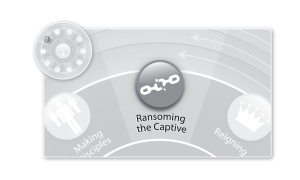Part IX of our series on Ransoming the Captive
 Joseph J. Gross is someone has spent a lot of time studying the ransoming activity of the Trinitarian order. The interesting thing is, ransoming Christians out of prison was for them just one small step in the overall process of ransoming captives. Check out what he says:
Joseph J. Gross is someone has spent a lot of time studying the ransoming activity of the Trinitarian order. The interesting thing is, ransoming Christians out of prison was for them just one small step in the overall process of ransoming captives. Check out what he says:
“The aftercare of released captives returning to Christendom was an essential part of Trinitarian ransom activity. Trinitarians provided spiritual, moral and physical support to the repatriated. Many of those ransomed were too sick or weak to continue their journey home directly. Some had no one waiting to welcome them back. The obligatory quarantine was always imposed in times of pestilence.
In all these instances, the ransomed captives needed to be sheltered and fed and cared for, perhaps for several days or perhaps for several weeks. And so, it was necessary for the Trinitarian Order to have houses with a hospitale as part of the complex, especially in coastal cities and along the routes most traveled by the returning captives.”
When you ransom a captive, in other words, money is necessary. But it’s typically the smallest part of what’s needed. What’s needed? Love. The love of Christ, poured through you over the course of the former captive’s lifetime. Love in the form of all eight of the Works of Mercy that we’ve studied, performed not only once as a random act of kindness, but offered freely again and again in a comprehensive pattern of care, coordinated with the church as a whole, until the captive is free not only spiritually but in all three dimensions of human life: spirit, soul, and body.
David Platt wrote the book, Radical. In there he has a great quote from Elisabeth Elliot, whose husband, Jim Elliot, was killed on the mission field by the people he came to serve. Elisabeth went on to take his place. She devoted her life to serving in Jesus’ name the people who killed her husband. And she wrote this:
“Is the distinction between living for Christ and dying for Him after all, so great? Is not the second the logical conclusion of the first? Furthermore, to live for God is to die, ‘daily,’ as the apostle Paul put it. It is to lose everything that we may gain Christ. It is in thus laying down our lives that we find them.”
Elisabeth points out that Scripture does not classify dying a martyr’s death as extraordinary obedience. It’s ordinary obedience when you are following a Savior who died in a cross—a Savior who said that, once ransomed, you should take up your own cross and follow him in his history-length quest to free others—a quest so determined that it makes Oscar Schindler’s amazing generosity pale in comparison.
Of course we spend our fortunes to ransom others. That’s what ordinary Christians have always done.
Of course we use our time and energy to fall in love with captives and learn how to cooperate with Christ as he undertakes the very complex work of setting them free.
God uses Peter and John to heal the handicapped man at the Temple gate in Jesus’ name, and their own freedom of movement is immediately constrained, just as Jesus had warned them it would be. Jesus—and all those who ransom in his name—almost always bear the burdens they ransom as belonging to them and Jesus.
It is in carrying these burdens willingly, not in spiritualizing them into moral oblivion, that they mirror the friendship-love and reliable divine care of Christ to the world.
You want to be used by God to heal a lame man? Are you willing—ready and willing—to go to jail for that? Be beaten? Lay down your life?
Think carefully on that. Your answer will profoundly impact the way you love others, and how fully God can use you for his purposes for the remainder of your days.










